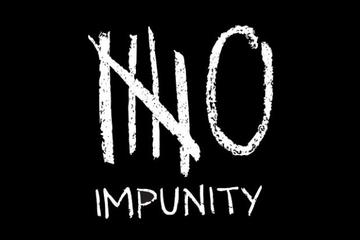
Nine crimes against journalists out of ten go unpunished: today, November 2nd, two campaigns are being launched with the hashtags #NoImpunity and #EndImpunity
696 is the exact number of journalists killed globally over the last ten years according to CPJ (Committee to Protect Journalists) data. The fact that 9 crimes out of 10 go unpunished highlights that impunity is not only a matter of (in)justice, but also of inaction by the authorities. On the other hand, international institutions have recently provided several tools to learn about and tackle the issue. In 2013, the UN General Assembly proclaimed November 2nd as the ‘International Day to End Impunity for Crimes Against Journalists’, while in 2014 Index on Censorship started mapping threats to press freedom across Europe. The last headline-grabbing case was the murder of Maltese journalist Daphne Caruana Galizia, killed by a car bomb on October 16th. However, lesser known stories have marked 2017.
Azeri journalist Afgan Mukhtarli disappeared on May 29th in Tbilisi, where he had fled in 2015 following political persecution due to a series of financial investigations he was carrying out. The next day, Mukhtarli was arrested in Baku for illegal border crossing and smuggling (as $12,000 were found on his person), then immediately sentenced to a three-month detention. Journalists and activists who supported Mukhtarli have been questioned by the police. Given that repressing media freedom has become routine in the country, it seems reasonable to think that Azeri authorities may have abducted him thanks to Georgian cooperation.
Three murder cases remain unresolved in Serbia, including the almost-vicennial case of journalist Slavko Ćuruvija, despite an illusory turning point in the trial three years ago. Iconic is the case of Tufik Softić, Montenegrin reporter for the opposition daily newspaper Vijesti, who was brutally beaten with baseball bats in 2007. In 2015, he filed a lawsuit against the state for ineffective investigation, which has caused him - he claims - constant stress and fear of being attacked again. This year, Sotić was eventually awarded €7,000 as compensation, becoming the first journalist in Montenegro to obtain some form of justice - a small positive note for the Balkan region, where an online platform (Safe Journalists ) to report attacks on journalists was established in 2016. Today, November 2nd, two campaigns are being launched: #NoImpunity and #EndImpunity . Self-organisation of journalists is essential, but only institutions can make a change.
This publication has been produced within the project European Centre for Press and Media Freedom, co-funded by the European Commission. The contents of this publication are the sole responsibility of Osservatorio Balcani e Caucaso and its partners and can in no way be taken to reflect the views of the European Union. The project's page

 Impunity for crimes against journalists, a matter of political will?
Impunity for crimes against journalists, a matter of political will?




 All the contents on the Osservatorio Balcani e Caucaso website are distributed with a
All the contents on the Osservatorio Balcani e Caucaso website are distributed with a 